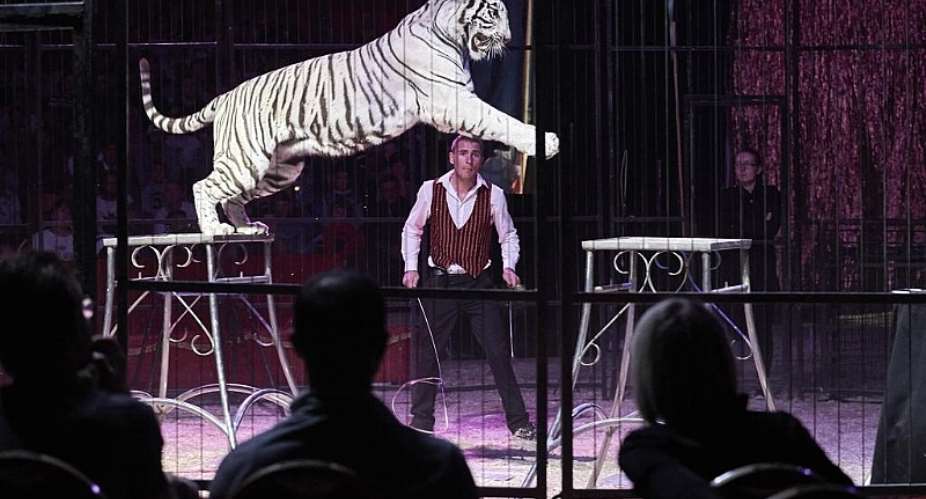France will progressively ban the use of wild animals in travelling circuses, the farming of mink for fur and the breeding of dolphins and orcas in captivity, environment minister announced on Tuesday. But no timeframe was given.
Environment minister Barbara Pompili announced the measures saying "our attitude to wild animals has changed".
Recent opinion polls appear to support her claim showing some 72 percent of the French in favour of banning wild animals in circuses.
France would also prevent the country's three dolphinariums from breeding or importing new dolphins or killer whales.
"Tigers, elephants, monkeys, dolphins, minks […] it is time that our ancestral fascination with these wild beings no longer means they end up in captivity," Pomipili added.
There are an estimated 500 wild animals in France's travelling circuses, and the minister said “solutions would be found on a case by case basis, with each circus, for each animal”.
The measures apply only to travelling circuses and it is not clear what will happen to, for example, theme parks that stage wild animals or birds of prey shows.
Victory for animal rights groups
Animal rights group Code Animal hailed "victory" after 15 years' worth of campaigning.
The animal charity 30 Million Friends also welcomed the ban, tweeting that the government had taken "the public's demands for the wellbeing of wild animals" into account.
It said it wanted the decisions to be pushed through as quickly as possible.
No date
But the minister was vague on the timeline for shuttering France's four mink farms and the use of wild animals for entertainment, saying only that it would be in "the years to come".
"Putting a date on it does not solve all the problems," Pompili said, adding she preferred "to start a process so that we get there as quickly as possible".
In the meantime the government would offer circuses and dolphinariums an aid package of up to €8 million to help them adapt to the bans.
"We are asking (circuses) to reinvent themselves," she said.
"It will be a time when they will need support, and the state will be at their side.”
The fur industry
The closing of mink farms in particular is likely to be popular with the general public. A recent IFOP poll showed 91 percent of the French supported a ban on fur farms.
A video shot by animal rights group L214 claimed to show minks on a fur farm in La Vendée in 2017 in filthy, cramped cages which would infringe EU laws against animal cruelty.
However, there is likely to be strong resistance from the French fur industry which has fought a rear-guard action in recent years against luxury fashion houses going fur-free.
A Europe-wide movement
Some 400 local councils in France have already imposed bans on the use of wild animals in travelling circuses.
In November last year Paris city council voted to withhold permits from 2020 for circuses that wish to operate in the French capital while employing exotic creatures.
It followed the case of a performing bear called Mischa who died at an animal refuge southwest of Paris, two months after he was rescued from owners who allegedly subjected him to years of cruelty.
But so far there has been no national ban and France still has dozens of circuses confining hundreds of animals - roughly 500 according to anti-circus campaigners One Voice.
While most circus animals are lions, there are also tigers, elephants, two hippos, baboons, macaques, snakes and parrots, camels, bears, ostriches and even zebras.
More than 20 EU countries have already either banned or heavily restricted the use of animals for entertainment.





 Meta releases new version of conversational AI across its platforms
Meta releases new version of conversational AI across its platforms
 Cape Town named Africa’s Best Airport 2024 by Skytrax
Cape Town named Africa’s Best Airport 2024 by Skytrax
 Bono East: Four injured after hearse transporting corpse crashes into a truck
Bono East: Four injured after hearse transporting corpse crashes into a truck
 ‘Be courageous, find your voice to defend our democracy’ — Sam Jonah urges journ...
‘Be courageous, find your voice to defend our democracy’ — Sam Jonah urges journ...
 Exodus of doctors, nurses and teachers have worsened because of unserious Akufo-...
Exodus of doctors, nurses and teachers have worsened because of unserious Akufo-...
 2024 election: Avoid insults, cutting down people in search of power – National ...
2024 election: Avoid insults, cutting down people in search of power – National ...
 ‘You passed through the back door but congratulations’ — Atubiga on Prof Jane Na...
‘You passed through the back door but congratulations’ — Atubiga on Prof Jane Na...
 Government’s $21.1 billion added to the stock of public debt has been spent judi...
Government’s $21.1 billion added to the stock of public debt has been spent judi...
 Akufo-Addo will soon relocate Mahama’s Ridge Hospital to Kumasi for recommission...
Akufo-Addo will soon relocate Mahama’s Ridge Hospital to Kumasi for recommission...
 We must not compromise on our defence of national interest; this is the time to ...
We must not compromise on our defence of national interest; this is the time to ...
